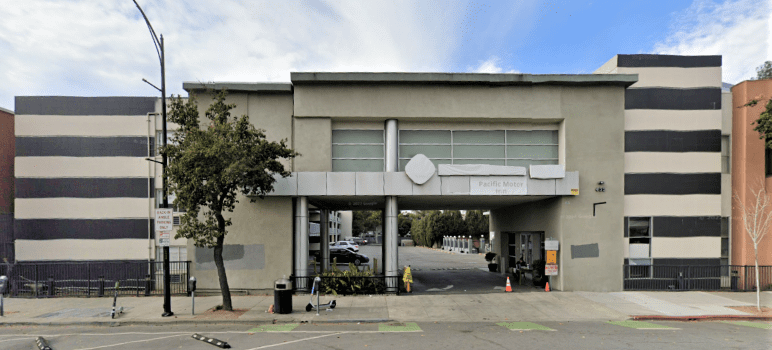By Dan Pulcrano @pulcrano / January 19, 2024 (San Jose Inside)

Pacific Motor Inn, site of new permanent housing for formerly homeless people, in SoFa district of San Jose. File Photo
During the pandemic’s early days, as tents, tarps and cardboard shelters overwhelmed creek beds, freeway embankments and sidewalks, converting empty motels into housing for the homeless seemed a creative solution.
In June 2020, when the $1.3 billion California program to buy up properties with federal Covid stimulus money was announced, San Jose Mayor Sam Liccardo expressed “deep appreciation to Governor Gavin Newsom and legislative leadership for creating the Homekey program… to confront the urgent needs of our unhoused residents.”
Hotel conversions and quick build small housing communities got underway in Palo Alto, Mountain View and San Jose. The next year, calling Homekey “the fastest, largest, most cost-effective addition of permanent housing in California history,” Newsom expanded the Homekey program with $2.75 billion in additional funding.
Spending huge sums of money quickly on novel initiatives when regulators are in lockdown is the government equivalent of a tourist wearing expensive jewelry in the town’s toughest neighborhood—an invitation to get ripped off.
Problems are starting to surface, particularly in non-urban municipalities without departments to monitor the fast-tracked conversions of hospitality assets into permanent housing for society‘s most vulnerable citizens.
California Attorney General Rob Bonta filed a lawsuit last week against LA-based Homekey developer Shangri-La Construction and its non-profit partner, Santa Monica-based Step Up on Second. Host cities have also been named in the suit.
The city of Salinas contracted for three projects intended to create more than 200 living units for the city’s unhoused, but only one of them was partially converted. An hour south of Salinas, in population 13,443 King City, a former Days Inn sits with a chain link fence surrounding its parking lot and a utility disconnection notice is duct-taped to its front door.
The case stitches together the pandemic-era emergency housing program, $20 million in missing funds, donations to California Gov. Gavin Newsom and a development firm founded by actor Elizabeth Hurley’s baby daddy, who killed himself in 2020. The firm still claims former President Bill Clinton as a strategic advisor in executive bios posted to the web.
According to documents reviewed in a Weeklys media group investigation, entities associated with the politically-connected Shangri-La Industries and Shangri-La Construction took $114 million in grants from the State of California, ostensibly to purchase and refurbish hotel properties in Central and Southern California. Once it secured titles to the properties, it illegally took out $54.7 million in loans and encumbered the properties with lenders’ deeds of trusts, according to allegations lodged by state housing officials.
Lawsuits now contend that the Delaware-registered firms borrowed funds and accepted public monies but didn’t pay its vendors, complete the projects or apply rents to pay its loans.
They skipped property taxes too. The Monterey County tax collector’s online portal displays bills that indicate the county will be owed $174,081 as of April 10 on two Salinas parcels, and $114,077 on two King City parcels.
The AG’s suit, filed on behalf of the state’s Department of Housing and Community Development, asks for the return of Shangri-La’s Homekey money as well as for court orders to block bank foreclosure proceedings and to secure the properties for affordable housing. California gave Salinas and Shangri-La $36.5 million to convert the three hotels into permanent housing for homeless residents. The King City project received $12.4 million in state funds.
Just months after the funding came through, on Dec. 22, 2022, Shangri-La moved $10 million from the project to its CEO’s credit union account.
In addition to the Salinas and King City projects, Shangri-La reportedly defaulted on projects in Redlands and Thousand Oaks. A similar fate has befallen a similar Shangri-La/Step Up project to convert a Ramada Inn in Asheville, N.C.
Shangri-La secured a total of $114 million in Project Homekey grants for its seven projects in San Bernardino, Ventura and Monterey counties. The projects were intended to create 500 permanent housing units.
The failed developer is now being accused of operating a “Ponzi scheme” by one of its lenders, according to a reported Dec. 8 court filing, an allegation disputed by the firm’s CEO in a Dec. 18 report by Los Angeles public radio station KCRW.
“In effect, Shangri-La is operating a real estate Ponzi scheme, where loans that were supposed to be reserved to complete specific projects were commingled with other funds and entities to prop-up other failing Shangri-La projects,” reads a Dec. 8 court filing quoted by Santa Monica public radio station KCRW.
“I’m not going to respond to that allegation at all,” Shangri-La owner and CEO Andy Meyers told KCRW. “We are an entity, Shangri-La Industries, and have a number of properties. But there’s no Ponzi scheme. Obviously, whomever made such an accusation doesn’t know what a Ponzi scheme is.”
According to the Los Angeles Times, Shangri-La took out loans against Project Homekey properties without state approval or incorporating the affordability restrictions.
A suit by BMO bank alleges that “In December 2022, Borrowers, without Lender’s consent, transferred nearly $9 million in Lender’s cash collateral out of the Borrowers’ BMO Accounts.” The legal filing contains copies of the Ventura Credit Union account in the name of Andrew Abdul-Wahab, an alias of Meyers, with a $7 million balance. BMO says at least $10 million in project funds that were part of BMO’s collateral were wired to the credit union account, out of reach of the secured lender should it try to collect on the defaulting loan.
BMO’s suit also says Shangri-La provided an inaccurate balance sheet, neglecting to include the nearly $20 million line of credit as a liability and the $20 million it had on deposit at a credit union as an asset. The credit line lists the Salinas Project Homekey site at 180 Sanborn Road as collateral.
Another Monterey County Superior Court suit filed by a Medalist Partners Asset-Based Private Credit Fund seeks damages from 1130 Broadway Street LP, which matches the address of the King City motel conversion project.
Shangri-La is also being sued by its contractors. On Dec. 28, Master Guard Security filed suit in Monterey County Superior Court alleging $28,594 in unpaid services on Shangri-La’s Salinas project. Northstar Development filed suit on Dec. 4 for unpaid bills of nearly $1.9 million on the project at 1030 Fairview Ave. in Salinas, which is currently in receivership.
The firm was started by wealthy entertainment industry investor Steve Bing, a large Democratic donor who gave at least $50 million to candidates and ballot measures over a 20-year period. The grandson of the Manhattan real estate developer Leo Bing, he inherited a $600 million fortune at age 18. Bing dropped out of Stanford University—where his parents had donated $50 million to build a world-class Bing Concert Hall—to move to Hollywood, produce movies and date starlets, as well as generously underwrite a range of high-minded social and political initiatives.
Recipients of Bing’s largesse included Gov. Newsom, U.S. Secretary of Health and Human Services Xavier Becerra and U.S. Sen. Alex Padilla.
According to Forbes magazine, ex-President Clinton was paid $2.5 million in consulting fees by Shangri-La Industries in 2009 and 2010.
On June 22, 2020, the 55-year-old Bing jumped to his death from the 27th floor of a luxury highrise apartment building in Los Angeles’ Century City district. Town and Country magazine reported that Bing had only $300,000 in liquid assets at the time of his death.
According to a lawsuit filed against Meyers by Bing’s daughter, Kira Korkorian, Bing sold Shangri-La Construction in 2017 to Meyers, but Meyers failed to pay Bing the promised amounts. Meyers’ bio says he once played professional football for the Buffalo Bills and pledged a $1 million donation to UCLA’s football program.
Meyers provided his lenders with a financial statement claiming a net worth of more than half a billion dollars, but the one-page balance sheet was thin on details and did not identify individual assets. Even Donald Trump’s inflated financial statements assigned line item values to known hotels and golf courses.
Step Up on Second Street, Inc., Shangri-La’s nonprofit alter ego, established individual LLCs for the projects, with attorney Judson Leibee named as contact. According to his LinkedIn resume, Leibee was Shangri-La Construction’s chief financial officer for seven years, until September 2016. A year later he became Step Up’s CFO, a position he held for almost six years, leaving in September 2023, when Shangri-La’s deals started to unravel.
In King City, where Shangri-La was slated to rehabilitate the motel to house individuals living near the Salinas River, the city has taken temporary measures. Those affected are being housed in an alternative location until at least June, according to King City Mayor Mike LeBarre.
“We have been proactive to ensure our project continues to move forward,” LeBarre said. “We are fortunate to have such great partners to help us find the funding to keep our homeless residents housed until this matter is resolved.”
On Tuesday, King City filed a lawsuit of its own.
Salinas Mayor Kimbley Craig says that the impacted cities are uniting to preserve the Homekey projects and shield themselves from Shangri-La’s defaults.
Meanwhile, weeds and garbage collect at the former Days Inn parking lot near King City’s Highway 101 Broadway exit, confirming that it’s been a while since any renovation activity has ensued at the Homekey project site, and openings in the stucco from a removed porte-cochère at the entrance exposes wood framing to winter rains.

